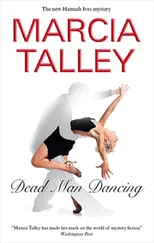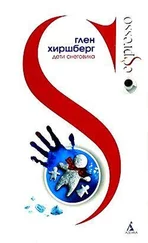Глен Хиршберг - Dancing Men
Здесь есть возможность читать онлайн «Глен Хиршберг - Dancing Men» весь текст электронной книги совершенно бесплатно (целиком полную версию без сокращений). В некоторых случаях можно слушать аудио, скачать через торрент в формате fb2 и присутствует краткое содержание. Жанр: short_story, на английском языке. Описание произведения, (предисловие) а так же отзывы посетителей доступны на портале библиотеки ЛибКат.
- Название:Dancing Men
- Автор:
- Жанр:
- Год:неизвестен
- ISBN:нет данных
- Рейтинг книги:4 / 5. Голосов: 1
-
Избранное:Добавить в избранное
- Отзывы:
-
Ваша оценка:
- 80
- 1
- 2
- 3
- 4
- 5
Dancing Men: краткое содержание, описание и аннотация
Предлагаем к чтению аннотацию, описание, краткое содержание или предисловие (зависит от того, что написал сам автор книги «Dancing Men»). Если вы не нашли необходимую информацию о книге — напишите в комментариях, мы постараемся отыскать её.
Dancing Men — читать онлайн бесплатно полную книгу (весь текст) целиком
Ниже представлен текст книги, разбитый по страницам. Система сохранения места последней прочитанной страницы, позволяет с удобством читать онлайн бесплатно книгу «Dancing Men», без необходимости каждый раз заново искать на чём Вы остановились. Поставьте закладку, и сможете в любой момент перейти на страницу, на которой закончили чтение.
Интервал:
Закладка:
He touched the toy nearest him, set it rocking on its terrible, thin wire. “Loh-ootkawve divahd-law,” he said, and then I was down, flat on my face in the street.
I don’t know how I wound up on my back. Somehow, somebody had rolled me over. I couldn’t breathe. My stomach felt squashed, as though there was something squatting on it, wooden and heavy, and I jerked, gagged, opened my eyes, and the light blinded me.
“I didn’t,” I said, blinking, brain flailing. I wasn’t even sure I’d been all the way unconscious, couldn’t have been out more than a few seconds. But the way the light affected my eyes, it was as though I’d been buried for a month.
“Dobry den, dobry den,” said a voice over me, and I squinted, teared up, blinked into the gypsy’s face, the one from the stall, and almost screamed. Then he touched my forehead, and he was just a man, red Manchester United cap on his head, black eyes kind as they hovered around mine. The cool hand he laid against my brow had a wedding ring on it, and the silver star in his nose caught the afternoon light.
I meant to say I was okay, but what came out was “I didn’t” again.
The gypsy said something else to me. The language could have been Czech or Slovakian or neither. I didn’t know enough to tell the difference, and my ears weren’t working right. In them I could feel a painful, persistent pressure.
The gypsy stood, and I saw my students clustered behind him like a knot I’d drawn taut. When they saw me looking, they burst out babbling, and I shook my head, tried to calm them, and then I felt their hands on mine, pulling me to a sitting position. The world didn’t spin. The ground stayed still. The puppet stall I would not look at kept its distance.
“Mr G, are you all right?” one of them asked, her voice shrill, slipping toward panic.
Then Penny Berry knelt beside me and looked straight into me, and I could see her formidable brain churning behind those placid grey-green eyes, the color of Lake Erie when it’s frozen.
“Didn’t what?” she asked.
And I answered, because I had no choice. “Kill my grandfather.”
II
They propped me at my desk in our pension not far from the Charles Bridge and brought me a glass of “nice water”, which was one of our traveling jokes. It was what the too-thin waitress at Terezin — the “town presented to the Jews by the Nazis,” as the old propaganda film we saw at the museum proclaimed — thought we were saying when we asked for ice.
For a while, The Tribe sat on my bed and talked quietly to each other and refilled my glass for me. But after thirty minutes or so, when I hadn’t keeled over again and wasn’t babbling and seemed my usual sullen, solid, bald self, they started shuffling around, playing with my curtains, ignoring me. One of them threw a pencil at another. For a short while, I almost forgot about the nausea churning in my stomach, the trembling in my wrists, the puppets bobbing on their wires in my head.
“Hey,” I said. I had to say it twice more to get their attention. I usually do.
Finally, Penny noticed and said, “Mr Gadeuszki’s trying to say something,” and they slowly quieted down.
I put my quivering hands on my lap under the desk and left them there. “Why don’t you kids get back on the metro and go see the Clock?”
The Tribe members looked at each other uncertainly. “Really,” I told them. “I’m fine. When’s the next time you’re going to be in Prague?”
They were good kids, and they looked unsure for a few seconds longer. In the end, though, they started trickling toward the door, and I thought I’d gotten them out until Penny Berry stepped in front of me.
“You killed your grandfather,” she said.
“Didn’t,” I snarled, and Penny blinked, and everyone whirled to stare at me. I took a breath, almost got control of my voice. “I said I didn’t kill him.”
“Oh,” Penny said. She was on this trip not because of any familial or cultural heritage but because this was the most interesting experience she could find to devour this month. She was pressing me now because she suspected I had something more startling to share than Prague did at the moment. And she was always hungry.
Or maybe she was just lonely, confused about the kid she had never quite been and the world she didn’t quite feel part of. Which would make her more than a little like me, and might explain why she had always annoyed me as much as she did.
“It’s stupid,” I said. “It’s nothing.”
Penny didn’t move. In my memory, the little wooden man on his wire quivered, twitched, and began to rock, side to side.
“I need to write it down,” I said, trying to sound gentle. Then I lied. “Maybe I’ll show you when I’m done.”
Five minutes later, I was alone in my room with a fresh glass of nice water and a stack of unlined blank white paper I had scavenged from the computer printer downstairs. I picked up my black pen, and in an instant, there was sand on my tongue and desert sun on my neck and that horrid, gasping breathing like snake-rattle in my ears, and for the first time in many, many years, I was home.
III
In June 1978, on the day after school let out, I was sitting in my bedroom in Albuquerque, New Mexico, thinking about absolutely nothing when my dad came in and sat down on my bed and said, “I want you to do something for me.”
In my nine years of life, my father had almost never asked me to do anything for him. As far as I could tell, he had very few things that he wanted. He worked at an insurance firm and came home at exactly 5:30 every night and played an hour of catch with me before dinner or, sometimes, walked me to the ice-cream shop. After dinner, he sat on the black couch in the den reading paperback mystery novels until 9:30. The paperbacks were all old with bright yellow or red covers featuring men in trench coats and women with black dresses sliding down the curves in their bodies like tar. It made me nervous, sometimes, just watching my father’s hands on the covers. I asked him once why he liked those kinds of books, and he just shook his head. “All those people,” he said, sounding, as usual, like he was speaking to me through a tin can from a great distance. “Doing all those things.” At exactly 9:30, every single night I can remember, my father clicked off the lamp next to the couch and touched me on the head if I was up and went to bed.
“What do you want me to do?” I asked that June morning, though I didn’t much care. This was the first weekend of summer vacation, and I had months of free time in front of me, and I never knew quite what to do with it anyway.
“What I tell you, okay?” my father said.
Without even thinking, I said, “Sure.”
And he said, “Good. I’ll tell Grandpa you’re coming.” Then he left me gaping on the bed while he went into the kitchen to use the phone.
My grandfather lived seventeen miles from Albuquerque in a red adobe hut in the middle of the desert. The only sign of humanity anywhere around him was the ruins of a small pueblo maybe half a mile away. Even now, what I remember most about my grandfather’s house is the desert rolling up to and through it in an endless red tide that never receded. From the back steps, I could see the pueblo, honeycombed with caves like a giant beehive tipped on its side, empty of bees but buzzing as the wind whipped through it.
Four years before, my grandfather had told my parents to knock off the token visits. Then he’d had his phone shut off. As far as I knew, none of us had seen him since.
All my life, he’d been dying. He had emphysema and some kind of weird allergic condition that turned swatches of his skin pink. The last time I’d been with him, he’d just sat in a chair in a tank top, breathing through a tube. He’d looked like a piece of petrified wood.
Читать дальшеИнтервал:
Закладка:
Похожие книги на «Dancing Men»
Представляем Вашему вниманию похожие книги на «Dancing Men» списком для выбора. Мы отобрали схожую по названию и смыслу литературу в надежде предоставить читателям больше вариантов отыскать новые, интересные, ещё непрочитанные произведения.
Обсуждение, отзывы о книге «Dancing Men» и просто собственные мнения читателей. Оставьте ваши комментарии, напишите, что Вы думаете о произведении, его смысле или главных героях. Укажите что конкретно понравилось, а что нет, и почему Вы так считаете.







